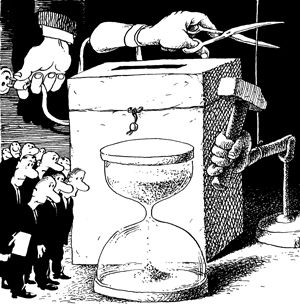Elections and a “gift” from the 1990s
Serhii ZHYZHKO: “Back in Kuchma’s time the government understood that it was possible to always cheat on people”
Though the sketch we suggested had been created back in 1996 by the caricaturist of genius Anatolii Kazansky, who, unfortunately, passed away, it reflects the current state of things very clearly, especially, the burning issue of elections concerned. In general, most of Kazansky’s sketches can be totally used to illustrate modern texts as they are still topical. Why? Because the system built in the 1990s has not been dismantled yet. The current situation comes from the past.
Leonid Kuchma became president in 1994 after one of the most democratic elections. However, five years later they held one of the dirtiest elections in the whole history of independent Ukraine. It is well-known that in 1999 Kuchma was reelected for the second term with the unprecedented use of administrative resources and black technologies. The main was tacking the communists back to the forestage. Their leader Petro Symonenko was made the main Kuchma’s opponent and the latter predictably won. During the first term of the second president they laid foundation of the existing political system: clannishness, oligarchy and spread corruption… Not just money, but big money came into politics.
“A lot of things happening now were laid back in the 1990s,” political expert Serhii Zhyzhko commented on the situation. “Back then they learnt to use technologies when the law is supposedly observed, but people’s thoughts are privatized and electors’ votes are distorted. The power was seized analogically to the privatization of plants and factories. The elections of 1990 and 1994 were more or less fair and there were not many manipulations and fraud. However, the presidential election of 1999 was very dirty. For example, in Kuchma’s time there was a tradition when heads of precinct electoral commissions used to come to district administrations and get other protocols or even packs of ballots. We have gone through all of this. Back then the power was not quite legitimate as it was formed through speculations and fraud.”
“They started a system when authorities, law-enforcement bodies and even secret services worked to achieve some needed result,” Zhyzhko emphasized. “Back then people who felt that they could privatize property, large enterprises by giving bribes and using administrative resources and machinations also realized that they could privatize election campaigns, parties, create new factions and manipulate political forces at the elections. They felt that people seemed to understand everything but were unable to change their mind quickly enough to successfully fight at elections with their subjects, the more that those subjects were bought later on. Results of elections are distorted by buying turncoats and so on. This is what Kuchma used to do. Then they realized that it was possible to always cheat on people.”
During the next five years of Kuchma’s rule (1999-2004) this system was only strengthened and spread. Impunity and permissiveness led to terrible things: the journalist Heorhii Gongadze was murdered, the public activist Oleksii Podolsky was kidnapped and beaten, the MP Oleksandr Yeliashkevych was assaulted… Those horrible pages of our modern history have not been turned yet because the old system is flourishing...
As a result, we got the Orange Revolution. “In 2004 people and the opposition mobilized but they did not manage to change the system,” Zhyzhko said. “The system was only strengthened and refined. Today the political regime is yet more centralized, cynic, aggressive and experienced in its pseudo-democratic demagogy. They learned to falsify at several stages. The first one is the public presentation of the candidate from power and targeted campaign for one or two years. The opposition has hardly any chance to present their candidate. The second step is creating constituencies, commissions, etc. This is where they manipulate and falsify. The third stage is the election campaign when opposition candidates are pressurized through administrative resources. The fourth stage is the process of voting when there are also manipulations. The fifth step is violations when calculating the votes.”
The example of falsifications and machinations of the election results is the situation in constituencies. Now it is absolutely clear that the Party of Regions lost the “battle” for Kyiv. There is not a single constituency where their representatives would get most of the votes. To maintain the appearance, members of the Party of Regions are doing their best to pull at least several independents loyal to the authorities. The symbol of confrontation is the district No. 215 where there is a keen struggle between Andrii Illienko from the Freedom Party and an independent, the secretary of the Kyiv City Council Halyna Hereha. The situation is similar in other constituencies and not only in Kyiv. Regardless of the fact that the abovementioned pseudo-independents and other authorities’ proteges have spent huge money for their constituencies and the administrative resources were at their disposal too, the main method of fraud when calculating votes was the delay in work of constituency electoral commissions.
Without changing this system of anti-rules dramatically we will return to Anatolii Kazansky’s cartoons for a long time.






